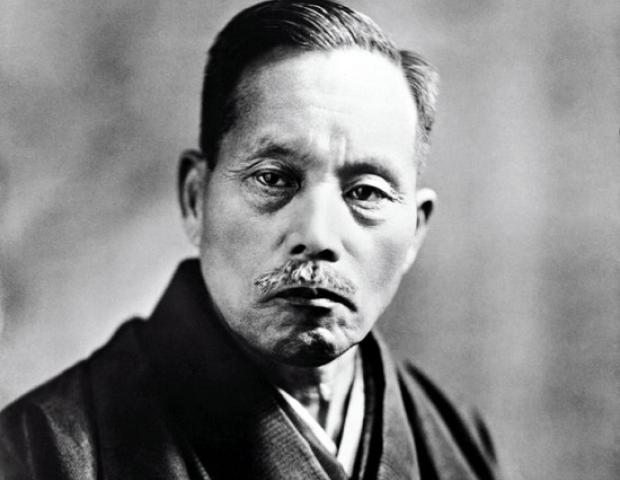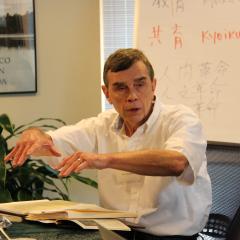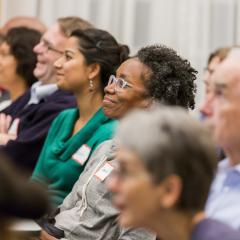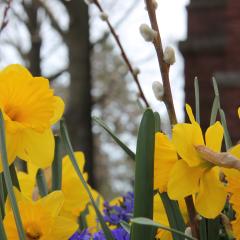Perspectives on Value-Creating Education
Tsunesaburo Makiguchi is the originator of the Soka, or value-creating, approach to education.
In this special resource from 2017, five educator-friends of the Ikeda Center offer personal reflections on what they see as the unique characteristics of soka, or value-creating, education, the approach to education first developed by Tsunesaburo Makiguchi in the early 20th century. Today, value-creating education is receiving fresh expression in schools and universities around the world. Here are some examples.
What the Soka Orientation Brings to Global Citizenship Education
Imagine a world where students are nurtured from budding shoots to maturity in a garden fertilized by humanistic educational ideals and cultivated by a host of educators who model the Buddhist bodhisattva ideal. These teachers practice the virtues of wisdom, courage, and compassion through their thoughts and words and actions, thus instilling these values in their students.
Through sincere care and trust in the potential of their students, they provide hope and encouragement for their students to become not only happy human beings, but persons who can challenge themselves to create value out of any condition and contribute to society.
Having attained this self-confidence, students are encouraged by teachers to engage in processes of active dialogue through which they develop an orientation toward global citizenship that extends beyond cognitive global awareness, linguistic proficiency, and international travel experience. Rather, the ultimate goal is for students to develop an ethos of global mindfulness: a genuine concern for the wellbeing of the planet and for all humankind.
Finally, as a result of the teachers’ own growth and inner transformation, accompanied by an accumulation of daily positive actions on behalf of their students, fruits of change are harvested even in the hearts of the most challenging or resistant students. Inspired by the humanity of their teachers, these protégés naturally align themselves with the cause of alleviating global suffering, both by acting individually and in concert with others.
This vision, based on the Buddhist thinking of Daisaku Ikeda and the general philosophy of soka (value-creating) education, is certainly idealistic, but it should not be written off as mere wishful thinking. Rather, it should be seen as a critical corrective to our current reality of a fragmented globalized world suffering from a litany of environmental, economic, sociopolitical, and spiritual crises, along with the problems of climate change and nuclear weapons, which threaten our very existence. In my view, this need is further justified here in the “Divided” States of America, where close-minded American-centric and xenophobic attitudes have been proliferating.
Why is Ikeda’s vision so relevant and equal to our challenges? From the Buddhist perspective, the causes of these global issues exist in the collective minds of people deluded by negative tendencies such as arrogance, greed, and ignorance. Our plight is further exacerbated by a failure to make human happiness the goal in every field, including in education. In his 1996 Teacher’s College address, “Thoughts on Education for Global Citizenship,” Mr. Ikeda emphasized this point, stating that “the human being is the point to which we must return and from which we must depart anew.” He also stated his conviction that education for global citizenship holds the key to resolving problems facing our planet.
The concept of global citizenship, with its assortment of definitions and critiques, is not novel to mainstream education. Unfortunately, it is too often based on an outdated industrial model with an amoral orientation predominantly driven by economic and political interests with the aim of developing human “capital” for global economic competition. Contrastingly, global citizenship education based on soka education philosophy aims to rethink the concept of global citizenship by bestowing it with a deeper humanistic and ethical meaning. Drawing inspiration from his predecessor, Tsunesaburo Makiguchi, and Buddhist humanism, Mr. Ikeda proposed in the Teachers College talk the following interdependent triad of virtues as a non-prescriptive framework for global citizenship:
- Wisdom to perceive the interconnectedness of all life
- Courage to not fear or deny differences, but to respect people of different cultures
- Compassion to maintain an imaginative empathy for those suffering in distant places
He also recommended the following elements – human rights education, environmental education, developmental education, and peace education – to be part of the basic curriculum for global citizenship education.
While many may be cynical or dismiss education for global citizenship based on soka education’s humanistic philosophy, I believe it is those simple, yet profound virtues such as wisdom, courage, and compassion that we need the most now to boldly address global issues confronting humanity.
* * *
Mahi Takazawa is a graduate of University of San Francisco’s doctoral program in education and a former Education Fellow of the Ikeda Center for Peace, Learning, and Dialogue. His research focuses on soka education and education for global citizenship.
Soka Education and One’s Behavior as a Human Being
Daisaku Ikeda places great emphasis on the immense value that can be created in the relationships between teacher and student. In his voluminous writings and public addresses, Ikeda maintains that a humane educator embraces and supports other human beings (i.e. students) to the point that the students also seek reward in embracing and supporting others. There is a growing body of literature discussing the pedagogy and guiding principles of soka education; however, I have found myself most interested in understanding the human qualities — including the behaviors and attitudes — that a teacher models when they strive to actually be a soka educator.
Since soka education is an approach to teaching and learning that owes much to Buddhist thinking, this is key. In fact, the thirteenth century Japanese Buddhist reformer Nichiren asserted that the reason for the Buddha’s appearance was to model how one should behave towards oneself and others, ethically and morally. “The purpose of the appearance in this world of Shakyamuni Buddha, the lord of teachings,” wrote Nichiren, “lies in his behavior as a human being” (The Writings of Nichiren Daishonin, Vol. 1, p. 852).
My sense is that cultivating one’s spirit and in turn the spirit of others is a major area of emphasis within Ikeda’s Buddhist-based vision of humane education. In his 1996 address at Columbia University titled, “Thoughts on Education for Global Citizenship,” Ikeda stated that the bodhisattva or “greater self,” a major aspect of Nichiren Buddhism, personifies the human qualities that one should strive to manifest. What is needed, in his view, is a great teacher who demonstrates how to cultivate this spirit. Within the same speech, Ikeda connected the bodhisattva with Carl Jung’s “self” and Ralph Waldo Emerson’s “the eternal One” or “the human spirit.”
This leads us then to a number of questions. What are the behaviors that cultivate the human spirit? How can teachers interact with others with sincerity and integrity? How can school leaders incorporate a culture or “ethos of soka” in their schools? How can school leaders assist in facilitating the quality teacher-student relationships that are a hallmark of soka education? Based on my experience as both a Buddhist and a special education teacher these are the areas of research that I have been exploring and want to further explore within the field.
Conducting research on soka education has only deepened my conviction in the need to share Ikeda’s principles widely. One reason is that the humanistically informed soka perspective on teaching and learning can reinvigorate the education system without necessarily disrupting the existing structures within schools. That is, by placing the emphasis on who the educator is and how they present that, there is an opportunity for value creation no matter the overall character of the school, be it one based on testing or one based on student freedom. My view is that soka education has the potential to enrich the lives of students, teachers, and school leaders by empowering them to continuously strive towards building a more perfect school community and a more harmonious and peaceful society.
* * *
Julia Hrdina is Director of School-age Services at Melmark New England, which serves children with severe disabilities. She earned a bachelor of arts degree in psychology from Boston University in 2006 and began her teaching career as a residential counselor for children with autism. In 2010, Julia earned her master of science degree in Special Education from Simmons College and, recently, her doctorate from Lesley University in Education Leadership.
What Ikeda retains from traditional humanism is the ideal of intrinsic human worth and the value of human agency.
Jim Garrison
What Makes Soka Humanism Unique?
Daisaku Ikeda often characterizes soka education as humanist education. Almost as often what he means by “humanism” is entirely misunderstood. In large part this is due to the “anti-humanist” critiques of Western metaphysics first developed in the late nineteenth century by Friedrich Nietzsche among others, which maintain that the ideas of anything or anyone having a fixed and final essence or substance, an unchanging foundation, or some ultimate purpose or telos was profoundly mistaken.
In the twentieth century, anti-humanism has been refined and extended by such thinkers as Sigmund Freud, structuralists such as Roland Barthes and Jacques Lacan, as well as post-structuralists and post-modernists such as Michael Foucault and Jacques Derrida. Other prominent anti-humanists include Martin Heidegger and Louis Althusser, who coined the term “anti-humanism.”
The historically most influential candidate for a human essence has been “rationality.” In education, this idea implies that “rationality” is the foundation and aim of all education.
Practitioners of soka philosophy and education are regularly rebuffed by the charge of “humanism” and simply dismissed from contemporary intellectual conversations as hopelessly backwards and reactionary. This is extremely ironical since Nichiren Buddhism, or any other form of Buddhism for that matter, shares very little with the Western metaphysics decried by the anti-humanists. The fundamental Buddhist principles of dependent co-origination (pratityasamutpada), emptiness or nonsubstantiality (sunyata), and the impermanence of all things (anicca) dispel any ideas of a fixed and final essence, fundamental foundation, or ultimate telos.
What Ikeda retains from traditional humanism is the ideal of intrinsic human worth and the value of human agency. He adds the ideal that the exercise of human agency should make the world better for all beings and not just human beings, since, after all, we are all interdependent. This successfully addresses the other main charge against humanists, which is that they are merely anthropocentric. Those that undergo what Ikeda calls a human revolution—which is a mode of inner transformation in which individuals actualize their unique Buddha nature by aligning the desires of the “lesser self” with the “greater self” of the universe—manifest a “humanism” almost unimaginable to the Western mind, especially the secular humanist.
Soka Gakkai literally means value-creating society. In such a society, every individual human being seeks to continuously create new value that brings benefit to one’s self while imparting good to the larger community, including not only human beings, but also all sentient beings and, indeed, the universe itself. In the process, individuals co-create themselves in the company of many others. Our “humanity” is created not found. In accordance with the principles of dependent co-origination, emptiness, and impermanence, value creation is not only an endless task, but also an endless joy.
* * *
Jim Garrison is Professor Emeritus in the Foundations of Education program at Virginia Tech in Blacksburg, Virginia. He also held appointments in the department of philosophy, as well as the science, technology, and society program and the alliance for social, political, ethical, and cultural thought. His work concentrates on philosophical pragmatism, especially that of John Dewey.
Cancer and Congratulations
This June of 2017, I had the pleasure of participating in a seminar at the Ikeda Center for Peace, Learning, and Dialogue called “Soka/Ikeda Studies and the Future of Education.” The free-flowing conversation among the diverse group of participants was resonant with experience-derived wisdom; I learned a great deal. Amid the many insightful contributions, one story stood out to me: To illustrate the soka concept of value creation, Jason Goulah told us about a meeting of soka educators at which one teacher shared the news of his recent diagnosis of cancer. Instead of outpourings of sadness, his colleagues offered congratulations on the learning that this new struggle would occasion for him.
After some initial cognitive dissonance at hearing such a jarring response to what is nearly universally recognized as a tragedy, I remembered a similar story about Carl Jung. He is said to have replied to patients’ joyful news of romance, promotions, and other good luck by saying “I’m sorry to hear that.” But, when the same patients entered his office weeping about betrayal, termination, and other devastating events, he responded with “Good, now we can do some work.”
Since then I’ve felt echoes of this idea resound in my day-to-day life. In presenting her dissertation research, one of my doctoral students talked about how the immigrant parents in her study came to the United States so that their children would not have to endure the struggles that dominated their own childhoods. Later in the defense (which was successful, by the way), she shared those same parents’ dismay that their U.S.-born children did not have the work ethic or sense of gratitude that they had hoped to impart to them. But how could they? They did not have the opportunity to forge such traits through the kinds of struggles that had shaped their immigrant parents’ characters.
In discussing privilege with students in my social foundations of education courses, I have long explained that each of us occupies both the ‘winning’ and the ‘losing’ position in a power imbalance at different points in our lives. A wealthy woman is privileged by her class, but not by her gender. A straight Latino is privileged by his sexual orientation, but not his race. Put bluntly, each of us is sometimes the oppressed and sometimes the oppressor. This summer, however, I added a new comment in this conversation: The best parts of who we are probably do not come out of our privilege.
Perhaps the reason I was deeply open to hearing the particular story about soka educators this summer is that the forces fueling some of my own oppressions feel so resurgent and so frightening. Catching TV news even for a few minutes gives me a twisting, sinking feeling in my core. It makes me feel like our society has cancer. Whenever a new expression of hatred or eruption of violence gives me that feeling in my stomach, I try to remember congratulations. I try to hold to Piaget’s lesson: that all learning comes from disequilibrium. I try to keep in mind that the best things about us, individually and collectively, emerge from struggle.
Congratulations, we have cancer.
* * *
Isabel Nunez is Professor of Educational Studies and Dean of the School of Education at Purdue University Fort Wayne. She is associate editor for the Oxford Encyclopedia of Curriculum Studies. She is currently vice president of the American Educational Research Association for Division B, Curriculum Studies. She is co-editor, with Jason Goulah, of Hope and Joy in Education: Engaging Daisaku Ikeda Across Curriculum and Context (Teachers College Press, 2021).
On Teacher Professional Development
When a seminar proves especially thought provoking, conversations among participants almost always carry on outside the official sessions. Those informal dialogues during breaks and meals are sometimes as engaging and inspiring as the formally organized part of the event. In particular, there are two conversations that I vividly recall from the soka education seminar I participated in at the Ikeda Center in June.
During the seminar, Kendrick Johnson, a former school administrator who is currently conducting professional development for teachers and administrators in Chicago and the St. Louis area, stated that administrators must learn to see teachers from a process-oriented perspective, not a product-oriented perspective. Over lunch, we further explored the role of the administrator to foster value-creating teachers. In many schools today, teacher evaluation is often primarily tied to students’ test scores, while other forms of value that they might be creating in their classrooms get ignored. This includes the relational and community-building aspect of teaching, as well as helping students apply their knowledge in their own contexts.
What this means is that novice teachers who cannot produce quantifiable results right away are frequently replaced with new ones, before these novice teachers have even had a chance to grow as educators. Many professional development sessions also focus on delivering prescribed curriculum or behavior management plans that “work,” an approach that does not take into consideration the individual uniqueness of the teacher. Kendrick emphasized the role of administrators as educational leaders, supporting the growth of each teacher in the long term so that they might go on to make their own particular contributions to their school communities.
This resonated with me because as a first-year teacher I struggled in many areas, from managing the class to creating the curriculum. I had the good fortune to have an administrator who, for each problem that arose, brainstormed solutions with me without imposing her opinion on me or judging my worth. Dr. Jim Garrison, who listened to my conversation with Kendrick, pointed out that it would be fascinating for an administrator and a teacher to collaboratively explore their professional relationship from a soka, value-creating perspective.
Inspired by these conversations, I started to think about the role of an administrator. What Kendrick, Dr. Garrison, and I were trying to get at, I believe, was the idea that administrators can and should provide in-service teacher education aimed at the holistic development of the teacher. This in-service teacher education should not be geared toward producing “highly-qualified teachers” defined by today’s standardization and accountability movement, as well as in pre-service teacher education that is increasingly regulated by content tests and edTPA. Instead, it should be rooted in dialogue between administrators and teachers to mutually explore the aim of education and the role of a teacher.
What might teacher education (both pre-service and in-service) look like from a soka perspective? Makiguchi wrote in an essay titled “Critique of the Content of Teacher Education” (Makiguchi, 1981-1988, Vol. 9) that the purpose of teacher education is to raise people who can practice value-creating education with their students. Therefore, teacher education should explicitly teach the pedagogical knowledge to lead students through the steps of direct observation in their communities, apperception (learning) in the classroom, and then application (value creation) in their daily lives.
Makiguchi also argues that the role of principals is to guide in-service teachers to practice value-creating pedagogy with their students (Makiguchi, 1981-1988, Vol. 8). In other words, principals should be able to provide professional development to in-service teachers. Currently there is no research in the field of soka studies that explicitly deals with teacher education or educational leadership, so I am working with my colleague to translate the above-mentioned essay by Makiguchi on teacher education. I believe that this is an important gap in the field that needs to be filled in order for the field of soka studies to have a long-term positive effect on educational practices.
* * *
Nozomi Inukai is a former Japanese-English bilingual education elementary teacher and was a 2018-2020 Education Fellow at the Ikeda Center. She earned her PhD in Curriculum Studies from DePaul and has published in multiple edited volumes and journals, including Schools: Studies in Education, Critical Inquiry in Language Studies, Journal of Language, Identity, and Education, and others.



